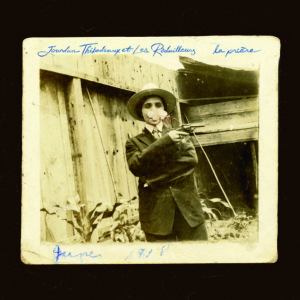If you think this is more traditional fare of alternating Cajun two-steps and waltzes, then skip on by. That would be the conventional approach, but Jourdan Thibodeaux is hardly a conformist. He writes his originals on his fiddle, and doesn’t listen to music while driving his truck, instead preferring to hear melodies mentally. The 37-year-old’s command of French is excellent, something he speaks most of the time at home with his family. The lyrics are more critical than any dance beat here, though there are spots here suitable for energetic jitterbugging or slower blues dancing. When he has a few tunes ready, he demos them to his Rôdailleurs bandmates Joel Savoy (guitar/producer) and Cedric Watson (accordion/fiddle), and then everyone collaborates on the masterful, intricate arrangements.
Regardless of whether it’s all hardwood floor danceable, there’s substantial energy to the proceedings. Savoy’s guitar playing is loaded with impressive solos, fill-ins and tasty tones that are otherwise unobtrusive. Watson complements with sterling fiddle rides and does twins with Thibodeaux on a few tracks. Best of all, the group compliments Thibodeaux’s tales and raw emotions well. They thunderously echo the bumpy rhythms of his passionate, exuberant vocals on “Ne Dans un Ouragan,” an autobiographical account of sorts, and lay down a slinky, sensuous groove on “C2MPK2D.” On the rollicking rowdy “One Step de Rôdailleur,” Watson’s accordion solo is quite creative.
While Jourdan Thibodeaux doesn’t attempt to mimic tradition, there are subtle nods to Louisiana French music’s past. “Equand J’ètais près mourir” feels like a rocking, generations-removed adaptation of an ancient Creole tune from the Lomax Archives with desperate pleas for his mother to pray for his gasping, dying soul. “Cypress Island Stomp” takes a jab at “Bosco Stomp”—but with its own melody.
Though he’s a proud product of his culture, there are moments when it seems his music could penetrate the Francophone world. One example is “Batailleur,” a ferocious fiddling firestorm that would be perfectly at home in French Canada.
While every tune is remarkably performed, the last track, the mind-blowing “La Prière,” transcends everything. It’s a powerful call to action urging Cajuns to embrace their culture and immerse themselves in their language. Thibodeaux contends it’s easy to blame those before you, but the past doesn’t have to be the future.
“La Prière” starts with a drone and a spooky Indian sitar-sounding dangling intro that hints some transcendental meditation is in store. Thibodeaux’s French-speaking grandfather is heard in the background, and in between gripping verses, Thibodeaux and Watson chant like a retinue of Tibetan monks: ‘You live your culture, or you kill your culture/There is no middle’ (translated). The grandfather’s voice fades out and eventually Thibodeaux’s daughters join the chant. Soon thereafter he and Watson exit, symbolizing how the torch has been passed to another generation. With all its effects and layers, it’s an epic listening experience that’s inexplicably breathtaking and soul-cleansing. It could become Cajun music’s next cultural anthem, this generation’s equivalence of Zachary Richard’s “Réveille” (“Wake-up”). Thibodeaux’s a game-changer.



